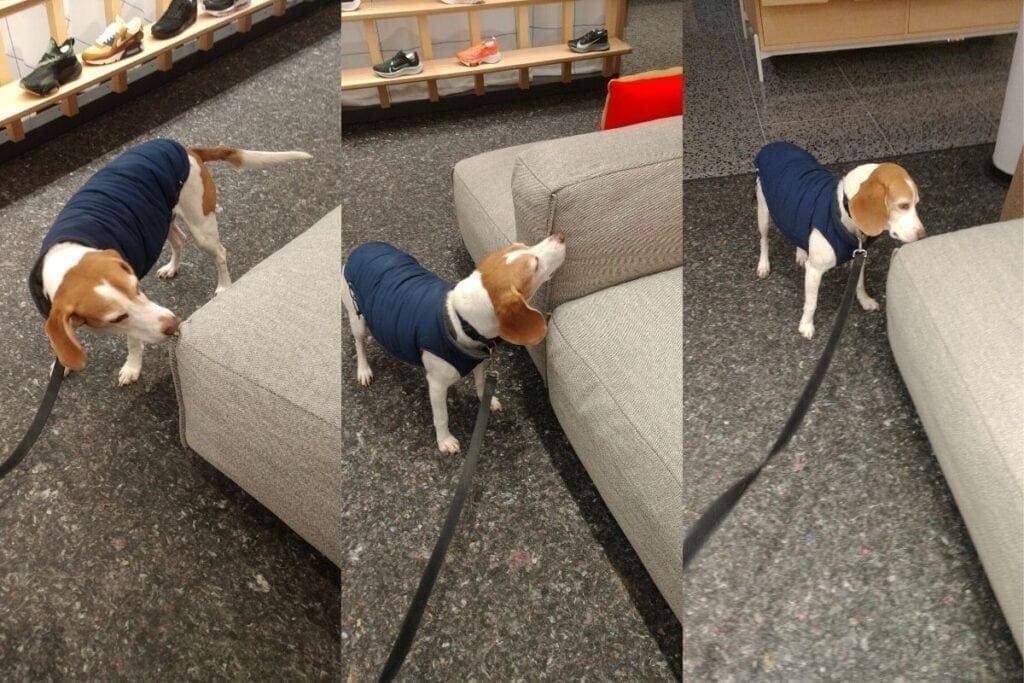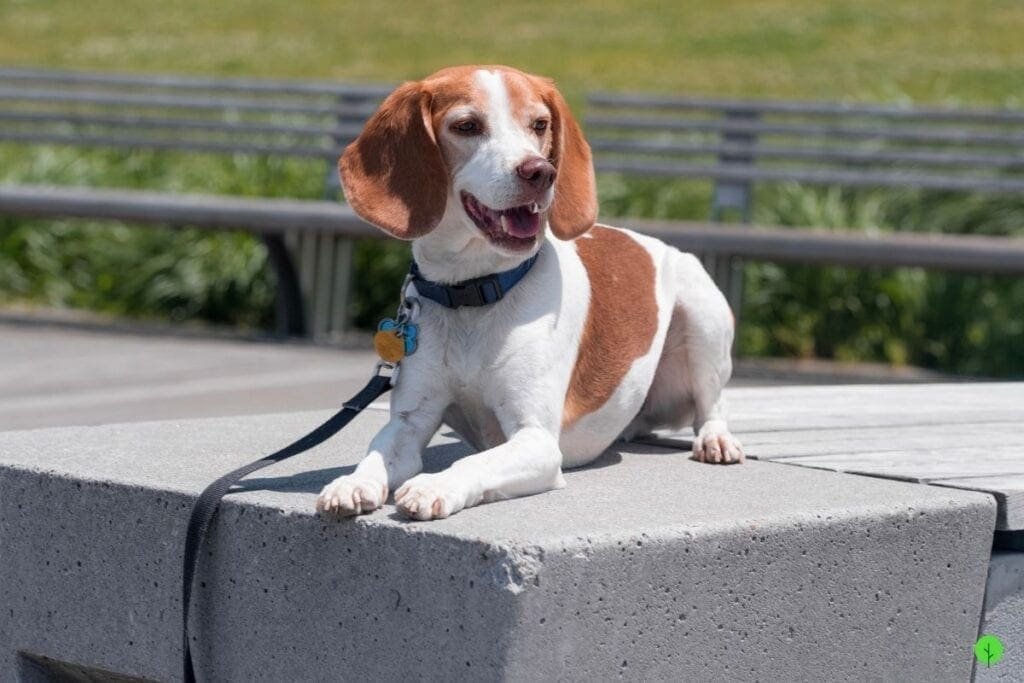
Bed bug dogs have a very special job in New York City: sniffing out pesky bed bugs.
As every New Yorker knows, bed bugs are a common scourge that plagues tens of thousands of homes each year.
Even worse, these pests are great at hiding, multiply quickly when left undetected, and can be very difficult and expensive to get rid of.
Hard-working bed bug detection dogs like Dexter (pictured above) are employed by the city and local pest control companies to help humanity fend against these tiny invaders.
At MMPC, we consider ourselves lucky to be able to work alongside man’s best friend to provide much-needed bed bug inspection services.
Can dogs really sniff out bed bugs?
Yes—and they do it very well. Compared to visual inspections by human inspectors, dogs can detect bedbugs faster and more accurately.
By the standards of the animal kingdom, humans don’t the most observant sense of smell. We only have 5 to 6 million olfactory receptors compared to the 225 to 300 million olfactory receptors in a dog’s nose.
Bed bug dogs can sniff out bed bugs where and when humans can’t. As mentioned in this article about bed bug signs, bed bugs have a distinctive musty odor. Humans typically only notice this smell once the infestation is already quite severe, but dogs can pick up the scent very early on, even from a single bed bug.
How accurate are bed bug dogs?
With their powerful sense of smell, specially-trained canines can pinpoint not only individual bugs, but also skin casing, eggs, and other signs that are easily missed by humans.
In fact, bed bug detection dogs can locate individual bed bugs with 96% accuracy. For a typical infestation, their accuracy increases to 98%.
But what about the remaining 2% error rate? Worry not! That’s why every certified bed bug detecting canine is actually a team of two: dog and handler. Every time the dog signals the presence of bed bugs, the handler performs a visual inspection to confirm (or disprove) the accuracy of the dog’s work.
Teamwork improves the overall accuracy rate of bed bug inspections and eliminates false positives. This human-canine connection is so important that the National Entomology Scent Detection Canine Association (NESDCA) will only certify trainers and dogs as a pair.

What does a canine bed bug inspection look like?
Each canine bed bug inspection team consists of a dog and a handler, who arrive together at the client’s home, office, or business.
Prior to the inspection, clients are expected to follow some basic preparation procedures, such as removing clutter and shifting furniture away from walls where bed bugs might be hiding.
At the start of the inspection, other humans and pets are asked to leave the premises to limit the number of unfamiliar scents. Although our dogs are very friendly, we ask clients not to give pets or hugs until after their job is done.
The dog is guided by the handler to check each room, thoroughly sniffing out all possible bed bug hiding locations. If anything is found, the dog sends a signal to the handler, who confirms the discovery with a visual inspection. Any evidence of bed bugs (or lack thereof) is noted down and the dog earns a well-deserved treat.
As veterans in the bed bug services industry, the experienced bed bug dogs at MMPC are highly trained and can discriminate between live bed bugs and viable eggs from dead bugs, shell casings, and fecal matter.
This helps the human inspector distinguish between active versus old infestations in different areas, in order to provide clients with the most appropriate and cost-efficient recommendations for treatment solutions.
How are bed bug dogs trained?
Many bed bug scent detection canines, such as our own Dexter, Riley, and Roxy, started as ordinary dogs up for adoption in a shelter.
After being adopted by companies like MMPC or organizations like the NYC Department of Housing Preservation and Development (HPD), the pups are raised and trained at specialized scent detection facilities.
During the initial training, they learn to identify the scent of bed bugs, even distinguishing between live bugs, dead bugs, viable eggs, and hatched eggs. This process typically takes around 6 to 9 months.
After early training is complete, each canine bed bug sleuth is paired with a responsible handler who is hired to perform inspections with them and provide care on a daily basis.
After additional training to familiarize the new pair with inspection protocols and signals, the handler and the dog are certified as a bed bug inspection team by organizations like the National Entomology Scent Detection Canine Association (NESDCA) and the World Detector Dog Organization (WDDO).
How are bed bug dogs cared for?
At MMPC, we place a high level of trust in our handlers. Each candidate is carefully screened and vetted—not only for their skills but also for their personality and compatibility with their new canine partner.
As part of their job, our canine handlers host our bed bug dogs and care for them around the clock. All expenses, such as food, supplies, and vet visits, are covered by our company.
When not performing inspections, each canine team is also given routine training and supplies to practice with. Just like our human employees, each of our bed bug dogs also gets plenty of rest and vacation time to play, relax, and recharge.

How are bed bug dogs certified?
Bed bug dogs and their handlers are certified together as a team. Together, they undergo rigorous tests to ensure that their proficiency in locating and identifying bed bugs meets the high standards set by the organization.
Experienced evaluators, who are seasoned bed bug inspectors themselves, grade the canine and handler team as pass or fail.
Concealed containers with live bed bugs are hidden in various locations of a mock apartment, hotel, or office building. At least two “distractors,” which are strong non-bed-bug-related scents such as food smells, are also hidden. The evaluators see if the dog is able to pinpoint the locations of the live bed bugs to the handler while ignoring the distractors.
If the team passes, they are officially certified to perform bed bug inspections. Teams must be re-certified every two years in order to ensure their skills stay sharp.
How long do bed bug dogs work before they retire?
The average retirement age of bed bug dogs is around 10 years, depending on the breed, health, and overall happiness of the individual.
At MMPC, two of our veteran bed bug dogs, Dexter (age 9) and Riley (age 10), are expected to enter retirement soon.
After they retire, Dexter and Riley will continue to live comfortably with the handlers that they have worked and bonded with. At organizations like ours that employ working animals ethically, even after retirement each of our dogs’ needs and expenses will continue to be covered generously for the rest of their lives.
Top bed bug dog inspection services — MMPC
MMPC is the #1 highest-rated pest control company offering canine bed bug inspection services in New York City and beyond.
Our inspections help clients answer three important questions:
- Do you really have bed bugs?
- If you have bed bugs, where are they hiding?
- What is the size and scope of the infestation (e.g. is it isolated or not)?

When looking for canine bed bug inspections, New Yorkers should be wary of uncertified or undertrained canines and teams.
Although more and more pest companies now offer bed bug dog services, many of them are not certified by third-party organizations like NESDCA. Oftentimes their dogs are also not able to distinguish between live bugs from dead bugs and non-viable eggs, potentially mistaking signs of an old infestation for an active one.
At MMPC, all of our canine inspection teams are certified by NESDCA and maintain the highest quality standards when performing bed bug inspections.
Any findings from our bed bug dogs are always confirmed through visual inspection, and we provide objective and unbiased recommendations for treatment.
